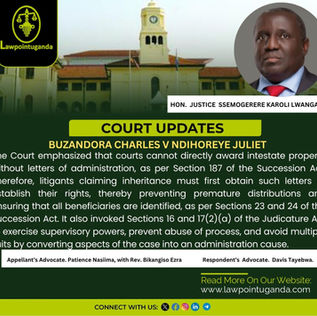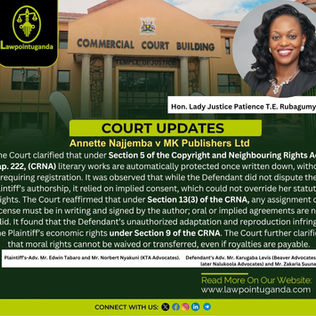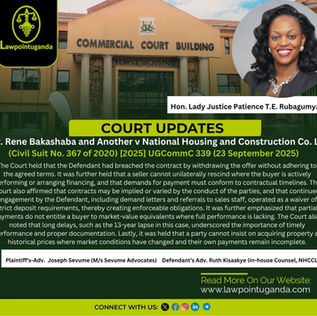top of page
BLOG POSTS
DISCLAIMER
This blog does not contain legal advice. The legal information is provided for general informational and educational purposes only and is not a substitute for professional advice. Accordingly, before taking any actions based on such information, we encourage you to consult with the appropriate professionals. Authors are liable for any plagiarism and Lawpoint Uganda won`t have liability towards the same.


A purchaser alleging full payment must produce clear, acknowledged evidence of each installment; unverified handwritten notes are insufficient, High Court at Kampala Rules.
The Court observed that although the Defendants did not produce any witness testimony in their defence, this omission did not in itself shift the evidential burden onto them. It reaffirmed the settled legal principle that a defendant’s failure to call witnesses does not automatically entitle the plaintiff to judgment; the plaintiff must still discharge the primary burden of proof through cogent and credible evidence. Citing the reasoning in Tucker Mubiru v Attorney General, C

Waboga David
Oct 6, 20254 min read


ECCMIS service is legally valid and binding. Once a hearing notice is validated and posted on ECCMIS, it constitutes effective service under Order 5, Rule 8, of the CPR, High Court at Kampala Rules.
The Court emphasized that, unless there is proof of a system failure or glitch, service through ECCMIS is legally valid and effective, having the same legal effect as personal or physical service.

Waboga David
Oct 6, 20252 min read


Suing a Deceased Person Renders Proceedings a Nullity, High Court at Wakiso Rules.
The court distinguished between suits instituted against a deceased person (void ab initio) and those where a party dies during pendency (which may continue with proper substitution). Citing Ddamba Susan v. John W. Katende & Fredrick Ssempebwa and other precedents, the court held that a suit against a deceased person is a nullity and cannot be cured by amendment. The Notice of Motion was further defective for failing to state grounds and lacking an authorized court official’s

Waboga David
Oct 5, 20255 min read


The property of a deceased intestate cannot be directly claimed in court without obtaining letters of administration. Even rightful heirs must pursue succession proceedings, High Court in Kabale Rules
The High Court emphasized that no rights to intestate property can be established without letters of administration. It also invoked Sections 16 and 17(2)(a) of the Judicature Act to exercise supervisory powers, prevent abuse of process, and avoid multiple suits by converting aspects of the case into an administration cause. Reference was made to precedent in Kiiza v Uganda (Misc. Application No. 118 of 2025) for using inherent powers to address legislative gaps.

Waboga David
Oct 4, 20254 min read


Constitutional Court of South Africa Confirms Equal Parental Leave Entitlements for All Parents
the Court has suspended the invalidity for 36 months to allow Parliament to enact remedial legislation. In the interim, it has ordered an immediate reading-in to the BCEA, entitling both parents to share a total of four months and 10 days of paid parental leave. This reform promotes gender equality, parental dignity, and flexible childcare arrangements, with significant implications for employers, employees, and the state. No interim changes apply to UIF benefits pending furt

Waboga David
Oct 4, 20252 min read


Court Slaps MK Publishers with UGX 100M Damages for Infringing Author's Children's Folktales, Affirms that Copyright Protection in Uganda Is Automatic Once an Original Work Is Fixed in Material Form.
The Court reaffirmed that under Section 13(3) of the Act, any assignment or license of copyright must be in writing and signed by the rights holder; implied consent or oral agreements are legally insufficient. The Court noted that MK Publishers altered, adapted, and sold four of the Plaintiff’s stories to the Government of Rwanda without any written license or authorization. The Court found that such unauthorized adaptation and reproduction constituted infringement of the Pla

Waboga David
Oct 2, 20258 min read


High Court at Kampala (Family Division) revokes fraudulent grant of Letters of Administration, affirms that removal of a caveat on land without notice to the caveator violates natural justice.
The Court observed that the Administrator General is vested with statutory and fiduciary duties to exercise due diligence when issuing Certificates of No Objection. It noted that in this case, the 2nd Defendant ignored clear records in the Succession Register showing that the deceased had died in 1939 and that his estate had already been distributed. By nevertheless issuing a Certificate of No Objection in 2008, the Administrator General failed in its public duty of care. The

Waboga David
Oct 2, 20256 min read


The High Court at Mbale clarifies principles on fraudulent procurement of Letters of Administration, reaffirms that unregistered Islamic marriages remain valid under the law.
The court reaffirmed that a widow is the most suitable person to obtain a representation of her deceased husband's estate. In the normal case of events, she is the person who would rightfully, properly, and honestly safeguard the assets of the estate for herself and her children. Given their fraudulent conduct and unilateral dealings with estate property, the Court found the Plaintiffs unsuitable to administer the estate.

Waboga David
Oct 1, 20258 min read


High Court at Luwero Upholds Jurisdiction in Divorce Petitions Involving High-Value Matrimonial Assets but Mandates Territorial Transfer
The High Court affirmed its unlimited original jurisdiction to entertain divorce petitions under Article 139(1) of the Constitution, even where both parties are Africans (per Section 3 of the Divorce Act), particularly to avoid procedural delays in cases potentially involving matrimonial assets exceeding UGX 50,000,000. However, the Court emphasized strict adherence to territorial jurisdiction under Section 15(a) of the Civil Procedure Act, transferring the matter to the High

Waboga David
Oct 1, 20254 min read


The FIFA Legal Handbook
The FIFA Legal Handbook contains updated FIFA Rules and Regulations, statutory documents, legal guides, and circulars, offering a comprehensive overview of football's governing body's legal frameworks. It includes essential documents like the FIFA Governance Regulations, the FIFA Disciplinary Code, the FIFA Regulations on the Status and Transfer of Players, and the FIFA Clearing House Regulations, providing guidance to the global football community.

Lawpointuganda
Oct 1, 20252 min read


High Court Clarifies Contractual Obligations, Breach, and Remedies in Naalya Pride Apartments Condominium Dispute.
Contracts can be implied or modified by parties' actions, even if not strictly following written terms. Here, the Defendant's continued engagement (e.g., demand letters, referrals to sales staff) waived strict deposit requirements, creating enforceable obligations. Demands for payment must align with agreed terms (e.g., phased vs. lump sum). Sellers must provide reasonable notice of construction progress and deadlines, especially in delayed projects, to avoid breach claims.

Waboga David
Sep 29, 20255 min read


High Court Clarifies The Law on Nominee Shareholder Agreements, Profit-Sharing Obligations, and Directors' Duties in Investment Contract Dispute.
The court established that the Investment and Share Agreement of September 25, 2019, ratified the earlier agreement, as evidenced by the consistent 71% shareholding allocation and the parties’ conduct. Applying the objective test of contractual interpretation, the court clarified that a reasonable person, with knowledge of the parties’ prior dealings, would interpret the agreement as formalizing prior contributions.

Waboga David
Sep 27, 202514 min read


High Court at Kabale Convicts Accused in Rape Case, Calls for Aggravated Rape Offense and Mental Health Support for Victims.
From comments, the court observed rising sexual and gender-based violence (SGBV) due to economic, cultural, and awareness issues, noting defilement spikes during COVID-19 school closures. It reaffirmed trauma prevalence from conflicts and domestic abuse, citing a 2022 study (Opio et al.) showing 22.9% mental disorder prevalence in Uganda. The court observed legal gaps, urging “aggravated rape” for vulnerable victims and mental health referrals under the Mental Health Act, Cap

Waboga David
Sep 27, 20253 min read


High Court at Luwero Revokes Letters of Administration for Mismanagement of Estate; states that administrators are trustees, not owners. Treating estate property as personal property constitutes fraud
The court reiterated that the defendants treated the estate as personal property, fraudulently transferring titles without beneficiary consent. It further clarified that such actions breached fiduciary duties, as administrators hold property in trust for beneficiaries, not for personal enrichment, citing Christine Nazziwa v. Ismael Nyombi Gawera & Anor and the persuasive Kenyan case Re: Estate of Julius Mimano (2019 KLR).

Waboga David
Sep 25, 20255 min read


The English Court of Appeal has affirmed that WhatsApp messages and Emails Form a Binding Contract.
The Court held that a binding sublicence agreement was formed based on an email from the sublicensee confirming its intention to acquire FIFA Club World Cup media rights with key terms (rights, territory, exclusivity, financials); and the sublicensor’s reply accepting the offer and confirming a contract draft would follow. These exchanges, supported by extensive WhatsApp and email correspondence, created a binding agreement despite the absence of a signed formal contract.

Waboga David
Sep 23, 20252 min read


High Court dismisses claim against Equity Bank for delayed CRB clearance following a consent judgment, affirming that the CRB cannot update records without the bank’s confirmation.
The court clarified that, while Regulations 40(1) and (3) of the Financial Institutions (Credit Reference Bureau) Regulations, 2022, impose on CRBs the duty to investigate complaints within seven working days and require financial institutions to notify CRBs immediately upon receiving such grievances, banks nonetheless retain a critical obligation to submit updated settlement data to the CRB within 30 days of discharge, as affirmed in the testimony of DW1 (the defendant's wit

Waboga David
Sep 23, 20257 min read


Court of Appeal of Uganda Dismisses Government's Appeal on Procedural Grounds in High-Stakes Land Dispute Involving Refugee Settlement, Upholds Bulk of UGX 30 Billion Compensation Award.
The Court observed that the respondent's claim for UGX 30,067,542,200 was supported by the unchallenged valuation report of professional surveyor Mr. Obali Godwin, detailing market value for the 1,531.96-hectare suit land in Katikara, it eaffirmed the constitutional imperative under Article 26(2) for full market-value compensation in cases of unlawful deprivation by state agencies like the OPM, citing Attorney General v Henleg Property Developers Ltd (CA No. 421 of 2017, uphe

Waboga David
Sep 22, 20258 min read


High Court Grants Eviction Order for Vacant Possession Post-Mortgage Foreclosure, Affirming that Eviction and Possession Orders Do Not Extinguish Substantive Claims of Fraud, Illegality, or Ownership.
a statute “is not passed in a vacuum, but in a framework of circumstances, so as to give a remedy for a known state of affairs.”
The court emphasised that the purpose of the Mortgage Act is not to furnish borrowers with technical loopholes to stall repayment but to balance borrower protections with the lender’s legitimate right to prompt enforcement. Technical breaches should not be elevated above the broader policy goals of market stability, efficient debt recovery, and sup

Waboga David
Sep 21, 20258 min read


The Court of Appeal of Uganda has upheld the High Court's decision on the invalidity of the alleged forged will and fraudulent land registration in an Estate Dispute.
The Court observed that the discrepancies in will copies (e.g., formatting, lines) were "glaringly clear" and non-trivial, contradicting DW2's "one copy" testimony. Language conflict (Runyankole vs. English) undermined authenticity, with DW2's clarification unconvincing. As an illiterate, Erina required a jurat under Section 3 Illiterates Protection Act confirming explanation in her language—absent here, rendering it substantively invalid (Kasaala Growers, supra; Violet Nakiu

Waboga David
Sep 20, 20254 min read


An Overview of the Competition Regulations, 2025 in Uganda
For lawyers, this means clear guidance on how to advise clients, whether in getting merger approvals, responding to investigations, or shaping business agreements. For businesses, the message is even clearer: understanding and complying with these rules is no longer optional. The Regulations spell out what counts as illegal coordination between competitors, how dominance in the market is measured, and the kinds of conduct that will now be penalized. With fines and even impris

Lawpointuganda
Sep 20, 20255 min read


The High Court of Uganda at Bushenyi clarifies that minor omissions do not invalidate a charge unless they cause miscarriage of justice, accused need not prove alibi, but the prosecution must place...
This case reinforces that procedural defects will not automatically nullify proceedings unless they cause injustice. Sentencing courts must deduct remand time to avoid illegality, while appellate courts will correct reliance on inadmissible evidence but still uphold convictions if other evidence suffices. Compensation remains discretionary but must be reasonable and justified.

Waboga David
Sep 18, 20255 min read


High Court Convicts Accused of Kidnap for Ransom and Aggravated Trafficking, affirming that an accused need not participate in all stages of trafficking to be guilty; involvement in any part makes...
An accused need not participate in all stages of trafficking to be guilty; involvement in any part of the chain (e.g., planning, recruitment) suffices (Muhwezi v. Uganda, 2022; Bernard Onyandi v. Republic, [2018] eKLR). On aggravated trafficking in children, the Court, drawing from Bernard Onyandi v Republic [2018] eKLR, clarified that liability arises even if an accused only participates in one stage of the trafficking process. Finally, while departing from the assessors’ op

Waboga David
Sep 18, 20253 min read


High Court of Uganda at Gulu upholds the lower Court’s declaration of ownership over customary land and clarifies that silence or omission by witnesses does not amount to contradiction.
The High Court affirmed the Respondent as the lawful owner of the suit land and upheld the trial court’s award of vacant possession, permanent injunction, and UGX 10,000,000 general damages.

Waboga David
Sep 17, 20253 min read


High Court at Luwero affirms that the Electricity Regulatory Authority only has jurisdiction over compensation disputes where notice and consent were given; it cannot adjudicate trespass claims.
The Court examined Sections 67 and 70 of the Electricity Act. Section 67(1) permits a licensee to place electric supply lines on private land but requires minimal damage, prompt compensation, and, under Section 67(2) and (4), prior notice and consent of the landowner unless otherwise agreed. ERA’s jurisdiction under Section 70 is limited to compensation disputes where consent was sought and the landowner disagreed with valuation/compensation. Where a licensee enters land with

Waboga David
Sep 17, 20254 min read
Follow us:
bottom of page
























.jpg)
